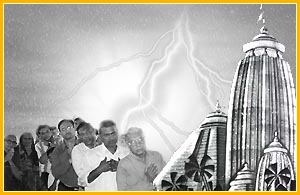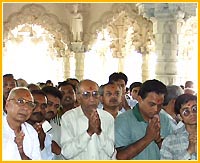
|
 |
 |
| Prayer - Wishes Turned Godwards | |||
|
Published
on: May 08 2001
|
|||
|
One may be tempted to brand such time-bound prayers as 'plastic' or 'hypocritical' where God is called upon in a 'use and throw' manner. However, from a broader viewpoint, it is the insecurity of possible failure that prods the youngsters to reach out for help from a higher force. In reality, what makes the kids pray, often makes the elders pray. On the surface the problems may differ; they may not be of passing exams or pining for toys and trips, but they may be of getting jobs or wanting a fatter pay packet. Whatever the case or condition, the basic observation remains unchallengably true that most human prayers spring from a common feeling of insecurity, helplessness or hopelessness. Prayers,
a last resort? It was the same during the devastating earthquake that made Mexico City look like a cardboard city, tearing it apart from end to end. Thousands of residents were seen praying day and night for weeks following the catastrophe. God had been called upon to ease the misery! The three year long drought
and famine that scared the land and lives of people in Gujarat in 1986,
1987 and 1988 did much to polish up the religious faith of millions.
Prayers were resorted to as the last hope for rains; obviously, after
all attempts of artificial rains and other human devices had failed
miserably. The
Story of 'Gajendra Moksha' In the early stages of the story, Gajendra, the elephant, dallies in a lake. Midway, his front foot is caught by a crocodile. A battle ensues. The mighty Gajendra works all his strength to go ashore but water is the homeground of the crocodile; its power is beyond match with Gajendra's foot as a rope locked in the vice-like jaws of a reptile. The scriptures say that the fight lasts for a thousand years; both warriors not budging an inch either way. But then, Gajendra feels his strength fading and the crocodile swooshes across the water surface in gaining victory. The water level rises furiously as the elephant begins to sink deeper and deeper. Just then, Gajendra sees a loose lotus flower floating astray in the lake water. He picks it up, turns it skywards and offers it to God in the form of a prayer for help. No sooner done, God leaves His throne in the heavens above and rushes to the scene and liberates Gajendra. The story of 'Gajendra Moksha' (Liberation of the King of elephants) is startling in the sense that it draws a sharp, clear focus on human nature. Man, stubbornly, tries to solve all his problems without the help of God or prayer but sooner or later confronts a series of stalemates, where he exhausts himself; it is under such conditions that he turns to God. Realizing that nothing and no one in this world can come to help, like Gajendra, man turns his wishes towards God. He makes a plea for higher help. This means prayer. Prayer,
a necessity for all "There are times in a man's life when regardless of the attitude of the body, the soul is on its knees in prayer." The most amazing of human achievers have admitted this attitude of secret prayer. Mahatma Gandhi, the man who led India to freedom confessed, "I would have been a lunatic without prayer." Lincoln, probably the most respected President of America was seen many times quietly praying on the battlefield during the Civil War. Dwight D. Eisenhower, America's hero of the Second World War and later President declared, "Personal prayer, it seems to me, is one of the simplest necessities of life, as basic to the individual as suntans, food and water - and at times, of course, more so." We also know the case of Arjuna - Narottamah; best amongst all humans. He was intelligent, of unsurpassed wisdom, handsome, a great warrior and a person who had conquered sleep. Even he, the valiant Arjuna was confused during the battle of Kurukshetra and finally surrendered to the Lord's feet praying, "Guide me, O Lord!" How
does a prayer help? Charles Steinmetz, the mathematical wizard of America seconds this view when he says, " I think the greatest discoveries will be made along spiritual lines. Some day people will learn that material things do not bring happiness and are of little use in making men and women powerful. Then the scientists of the world will turn their laboratories over to the study of God and prayer and the spiritual forces which as yet have been hardly scratched. When that day comes the world will see more advancement in one generation than it has seen in the last four." Divine
Prayers After Pramukh Swami Maharaj was operated upon, in 1986, for a large but harmless tumor in the upper right thigh, he was shown a video recording of his own operation. Overall, the operation looked a painful experience and seeing it on the screen Swamishri, at once folded his hands and prayed, 'Oh God! May no one else undergo such misery!" Before or after the operation Swami only prayed to protect others from such pains, not himself. Such prayers are the finest forms of communication with God. Swamishri always says, "Every sincere prayer is heard and answered!" God not only hears and answers our prayers, but rather as John Masefield emotionally put it, "God warms his hands at a man's heart when he prays."
|
|||
|
|
|||
|
|
|
© 1999, Bochasanwasi
Shree Akshar Purushottam Swaminarayan Sanstha, Swaminarayan Aksharpith
|
 Something
strange occurs at the mandir in Amdavad during the months of April and
May; hundreds of school kids from the neighbourhood schools are seen
climbing the mandir steps, jostling their way up to the main shrine.
Every year this scene repeats itself. Why? Because it is Exam Time!
The children come to pray for better results, and though they are hardly
seen throughout the whole year afterwards, they somehow appear in wholesale
bunches just about every time the exams arrive!
Something
strange occurs at the mandir in Amdavad during the months of April and
May; hundreds of school kids from the neighbourhood schools are seen
climbing the mandir steps, jostling their way up to the main shrine.
Every year this scene repeats itself. Why? Because it is Exam Time!
The children come to pray for better results, and though they are hardly
seen throughout the whole year afterwards, they somehow appear in wholesale
bunches just about every time the exams arrive! Victor
Hugo has neatly embroidered this truth in silken words:
Victor
Hugo has neatly embroidered this truth in silken words: